- Home
- Sherwood Smith
Twice a Prince Page 7
Twice a Prince Read online
Page 7
“Yes,” Canardan said heavily, before yet another guild master or mistress could belly forward and launch into a bad reading of four or five close-written pages, borrowing the most tedious phrases from old history books. “I see your point. And I promise there will be a hearing, attended by guild representatives as well as those of government, mage and military.”
The Chief of the Guild Council bowed. The guild masters and mistresses bowed. Canardan nodded, bending forward to lay his seal on the hot wax of the proclamation the scribe had written.
He noticed, distracted, that Jehan had slipped out, and shook his head. If only the boy had a head for governing.
The room began to empty. Suddenly stifled beyond bearing, Canardan rose, unlatched one of the long mullioned windows and let the wind blow in to cool his face, not hearing the muffled exclamations and curses of his scribes who dashed about trying to catch the flurry of papers that had taken to the air.
Chapter Eight
Lightning flickered and thunder rumbled like an avalanche of mountain-sized boulders across the sky as Prince Jehan ran up the backstairs, pausing long enough to note where everyone was.
Chas, as he’d hoped, had marshaled all the royal servants to straighten the king’s rooms which, because the king had commanded all his windows to be opened that morning, were a welter of puddles, papers and anything else that was not too heavy for the wind to smite spinning into chaos.
Jehan paused at his own rooms long enough to motion for Kazdi, who was bent on the same task, to follow. The boy left the other servants working, shutting the door to the outer parlor on his heels.
“Guard the stairs,” Jehan murmured.
Kazdi frowned. “Decoy?”
“Do it. Use the rock collection.”
The boy zipped inside the room, emerging with a silver bowl of exquisite crystal stones, which he scattered all over the landing, resting the bowl inside the door. Then he took up a stance from which he could see in all directions while Jehan raced up the marble stairs four at a time and down the hall to the tower where Atanial had been isolated. He stopped at the landing of her own stairway, where he suspected the spy-wards bordered—the larger the wards, the harder they were to maintain. He whistled the calls of night birds until apparently she recognized one of them as an anomaly and came herself to investigate.
She ran forward, fists pressed together under her throat. “What is it?”
“Stop there.”
She jolted to a stop, her hands flinging out wide as she pressed herself against the wall.
“It’s the wards,” he finished.
“I get it.” Her brow cleared. “If I cross, the mage spies know. Or if you cross.”
“Right. Chas is busy cleaning up the mess in the king’s rooms and making sure none of the other servants get a look at his papers. We probably have a few moments to talk.”
Atanial clasped her hands again. “You saw Sasha. She’s really all right?”
“She’s fine, as of last night. Riding west of Ellir. Listen. My father agreed to a hearing for the conspirators.”
Atanial did not waste time quibbling over the term. “And?”
“And so it frees you, do you see it?”
She frowned down at her tightly clasped hands, then looked up, eyes narrowed. The expression, so much like her daughter’s when she reached a conclusion, acted like a hammer inside his chest.
She said, “He can’t use their lives against me, not now. Is that it?”
“Yes. I will see what I can do to get you out.”
“Tell me more. Tell me what’s happening.”
“The cadets from Ellir Academy are on their way to their siege. Most of the harbor guards from three harbors are marching inland, ostensibly to war games.”
“That much I gathered. What does it mean? It’s not really war games at all?”
“Oh, they’ll play their extended war game through the harvest season, right enough. But the games will go on so long that they will be caught by surprise by the first snow, in which case they’ll have to winter along the border—”
She drew in a breath. “I see.”
“—where supplies will be carried over the next two months, stockpiled against spring, as harvest goods are carried in all directions. They can then launch an invasion over the border at the first snowmelt.” Because she not only seemed to comprehend, but was waiting for more, he said swiftly, “Leaving the harbors and coastline all but unguarded. Randart is busy making sure the coast is safe by his definition right now.”
“Pirate hunting, right?”
“The excuse is pirate hunting, but what he’s really going to do is clear the seas of anyone he deems inconvenient.”
Atanial said, “I don’t understand. So you rescued Sasha from the pirate?”
“I am the pirate.”
She pressed her knuckles against her forehead.
“I’ve been—”
“Wait. Wait. What were you doing before we showed up in this world?”
“Raiding the coast to keep the army pinned down there. Well away from the border.”
“And dropped everything to chase after my daughter?”
“I found out about Prince Math’s ten-year spell at the same time as Zhavic and Perran did. I couldn’t get to your world to warn you, but I got to the old castle in case they brought either of you back.”
She let out a long breath. “Our timing,” she said with Sasha’s crooked smile, “could hardly have been worse. Though it was not our fault we’re here in the first place.”
“Yes,” he said, because there was no time for anything but the truth.
“Does Sasha know that?”
“No.”
Atanial rubbed her eyes again. “I see. She wouldn’t listen.”
“It was a matter of trust.”
“I know. I’m afraid that’s my fault—”
A soft whistle from below caused her to freeze, poised for flight.
Jehan motioned her back to her rooms. They were both frustrated that that the interruption came right then.
Voices echoed up the marble stairwell. They belonged to Chas and Kazdi. The boy was busy shuffling gap-mouthed around outside the prince’s rooms, cleaning up the stones.
“…where is the royal heir?”
“Haven’t seen him,” Kazdi replied in his adolescent honk. “We’ve been here trying to restore order. The windows were open, and—”
The voices faded behind Jehan as he soft-footed down the hall in the other direction. He slipped into the dusty royal guest chambers, unused for years, and through the servants’ door there, as Chas reached the landing where he’d been before—to find it empty.
Chas cursed, ran back downstairs and dispersed with a few curt words his other trusted spies, who had been ordered by Randart to know where the prince was at all times. When at last they found him, he was sitting peaceably at a table in the heralds’ archive where the air was still and cool and the storm a rare low mutter. He was busy translating an old Sartoran treatise on the symbolism of flowers. He began a long, cheerful explanation of the treatise to Chas. “Do you not think this a fine gift for the Colendi ambassador when she reschedules her barge party?”
Chas bowed, effaced himself and placed a servant on watch in the outer chamber. Idiot!
Hours later Jehan finally was able to get to his rooms and grab a moment of privacy. Not that he expected any messages. Surely the entire kingdom had been grounded by the storm.
But there was one. From Owl.
Lost her.
Chapter Nine
Oh, nice going, Sasharia Disaster Zhavalieshin. I stared in dismay at the cheerful faces surrounding me.
There was absolutely no chance of escape. The mare was finished for the day, and I was shivering so hard I was afraid I couldn’t walk, much less ride.
They were waiting for an answer, and I hadn’t even heard the question.
Not that it wasn’t easy to guess what they wanted to know: Who are you a
nd where are you going?
What kind of lie could I possibly tell now that wouldn’t just cause more questions? Various stupid scams flitted through my mind, but it was one of the warriors that actually gave me my out.
“Maybe she’s a foreigner,” one muttered.
“That would explain her getting on the military roads,” a woman as tall as me spoke next, tossing back her short, curly auburn hair. “A foreigner wouldn’t know about the laws.”
“Likely blundered over at the river bend,” a fellow behind me said. “It’s the only place the two roads are close. Mare probably found the better footing, and there she goes.”
So far, they weren’t suspicious or angry, only curious. Or resigned, as they briefly disparaged the “river-bend turn”, one of them adding in a sour voice, “You know who’s gonna be detailed to build a wall between the two roads.”
I worked my numb lips, gesturing with my cold hands. They all fell silent. Marshaling all my knowledge of cartoon-character fake accents, I said, “Sheep. Shiiiip?” I mimed going up and down on waves. “Sailor.” I hit my tunic front with a loud, wet smack. I scowled. “Pie-rats.”
“Pirates!” the tall woman exclaimed. “Wager you anything they got hit by Zathdar’s gang.”
The others all made noises of agreement.
She turned back to me. “But what are you doing inland?”
I stared, uncomprehending, and one of the fellows said in a loud, distinct voice, as if loudness magically translated into other languages, “Where-do-you-come-from-and-why-are-you-here?”
I dismounted, my sodden clothing slapping against my limbs. I patted the horse, and pointed outside. “Home. Road.” I pointed west, waving my hand in a circle that encompassed most of the broadest continent in the world.
“Her ship must have been grounded by pirates. Or they were raided, and the crew turned off.” The woman addressed me slowly and loudly. “Where you from? Not Locan Jora—”
“Naw, they talk like us,” someone else said.
“Not Colendi either, I know a Colendi accent,” a younger guy spoke up.
“Oh, well, your kingness,” the big guy behind me retorted, and they all laughed.
“But I do! I got a cousin in service inside the—”
“Stow it. And your cousin too. She’s no Colendi, or where’s her coach and eight matched horses, diamonds and the like?”
“They’re not all toffs. That’s not even possible. My cousin’s a cook—”
“All Colendi swank,” the woman said, and the others made derisive noises of agreement.
The young guy sighed, eyes rolling up toward the ceiling.
Then they all started guessing, naming kingdoms—Devrea, Arland, Sarendan, Gyrn, Deshlen. Recalling some of the names I’d seen on that exquisite map aboard the ship while practicing the Khanerenth alphabet, I waited until they reached a couple of countries a bit farther west, and when one said, “Melia!” and another, “Couldn’t be Tser Mearsies?” I nodded violently, pointing somewhere between the two.
Triumph turned into a sick hiccup when the big guy came round front. He was a full head taller than I, broad face like granite, and a pleasant, helpful expression as he said, “Doesn’t Farhan speak Mearsies?”
I tried to hide my dismay.
The woman thumped him on the arm with her fist. I was surprised she didn’t break her knuckles. “Don’t you remember? Farhan got orders to run with one of the siege attack teams.”
They expressed sympathetic disappointment on my behalf. I beamed, unable to hide my relief, and they took it as a complete lack of comprehension.
“Never mind,” the youngest one declared to me, loudly and distinctly. “Come. We show you. Eat. Dry out.”
“Eeeeet. Dryyyy ouuuut.” I nodded like one of those bobbing toy things some people put in the back windows of their cars.
They surrounded me, everyone using loud voices, as if I were deaf and stupid. I shrugged, smiled and hefted my pack over my shoulder.
The warriors led me through a side door into a long hall that smelled of old cabbage, the oil they use on their weapons and wet wood. When we reached a big office, they all straightened up. The woman seemed to be taking a silent vote with her eyes—she was chosen—so she motioned me into the big room, where we found an older man seated behind a desk, a woman maybe ten years older than I at the wall, in the process of sticking pins in a big map. They turned around. After a quick exchange, the commander gave permission to house me until morning in the women’s barracks, adding, “Make certain she gets to the civ road at first light.”
“Yes, Captain.”
Next upstairs, where ten or twelve bunks lined the walls of a steep-roofed room. “Here’s where you sleep.” My guide pointed to the single bed with no gear hanging next to it and no chest neatly stored beneath it. As I hesitated, thinking of my wet pack, she took it out of my hands, which were beginning to tingle as they warmed, and yanked it open. “Here, let’s spread your things out. See? Spread. Out. Make sure dry.” She gestured with one hand, as she pulled things out with the other, hesitating when she saw the rolled firebird coverlet. She whistled. “Where did you get that?”
I grinned, rubbing my fingers with my thumb. “Buy. Much gold!”
“Oh yes, I’d say. You must have used half a year’s pay, unless sailors make ten times what we do. Phew, either you really love your family or you’ve got one handsome fellow waiting at home. Marda, come here, see this.”
“What? You got the foreigner in there?”
Three women entered, all of them exclaiming. “That’s a Zhavalieshin firebird! Aren’t those against the law?”
“Naw, only banners.”
“That is a banner.”
“And someone who knows it’s against the law obviously sold it off. Very sensible. She probably got it for a fraction of the real value. Hey! What’s this?”
As they spread the firebird coverlet out with careful fingers the innkeeper’s letter slid out and landed on the clean-swept wooden floor.
Another woman picked it up and looked at the address. “Three Falls Inn. Zhavlir. She must be running as a courier, to save the scribe-runner cost.”
“I would,” someone else spoke up. “You run letters, especially for inns, they almost always give you at least a meal, sometimes a free bed.”
“Wonder how they got the idea across.”
My auburn companion grinned. “They probably do the same in Tser Mearsies. Just because she lacks our language doesn’t mean she’s ignorant about regular life.” She turned to me. “What’s your name?” She thumbed the front of her tunic, saying, “Britki. That’s Marda.” She poked one of her friends. “Name! Britki. Marda.”
I was ready for that one. “Lasva.” I patted my soggy clothes, which made a wet smacking sound.
“Poor thing, she’s got to be icy in that stuff. Let’s get her before the fire.”
“Cleaning frame first.” Marda laid my coverlet out on the bed.
The third one put the letter next to it and they led me to the cleaning frame, which zapped away sweat and mud. The women took me downstairs, chattering past me as they decided between them that because of the wicked Zathdar my ship had been raided and the sailors set ashore.
As we gathered round a long plank table, they happily cursed Zathdar, whose raids had kept a lot of their friends on double-duty patrolling along the coast all during the summer, until the fleet recently set sail.
Then out came dinner, fresh cornbread, a thick pepper soup with cheese crumbled on top, and three kinds of layered fruit tarts. They got tired of shouting questions at me while I shrugged and smiled. Gradually they fell into their own conversations.
They reminded me of armed-services people at home—most of them big and buff, cheerful, neat either by inclination or by habit after years of inspections, full of jokes told in their own particular slang, jokes aimed at one another as well as their daily routine. The atmosphere was one of friendly rivalry, but the really creative commentary w
as reserved for the upper command.
“Didn’t I say? Didn’t I say?” one guy demanded, waving his fork, after someone commented about the storm. “We’re going to end up way out in the field up to our butt cheeks in snow before the rankers wake up and notice winter’s here.”
“No they won’t,” a woman retorted, arms crossed. “Because they’ll be kipped out inside the castle, whooping it up in disgusting luxury. It’s only us who’ll be frozen.”
Everyone laughed except the big guy, who shook his head. “Too late in the season for a big war game. Autumn’s gonna be short this year. You can smell it in the air. Crazy. Why not in spring, like it used to be? We’re gonna end up stuck in the snow.”
Bets were exchanged with brisk efficiency while others griped. Not revolutionary stuff. Nobody as much as looked over a shoulder. If anyone questioned the right of the Randarts to order what sounded like a massive siege war game involving nearly the entire army, they didn’t do it here. The griping was entirely confined to what seemed foolish timing, and what it would mean down at grunt level.
After the meal most of them vanished on various night duties; those off duty did the usual things people do when there is no television. They talked, mended uniforms, played card games. A couple of people played instruments—a kind of flute-recorder that did not need a reed and a stringed instrument—and one fellow with a good voice sang either love songs or funny marching songs with jokes I did not understand.
Their cards are all hand painted, and though I could see a kind of relation to our deck, it was different. Six suits, for one thing. The most popular game was with cards and markers, reminding me of bridge and chess at the same time. They did invite me in. From their manner, they believed a sailor would know this game so it had to be universal. I hunkered down by the fire, indicating I would sit there and dry out my clothes as I watched them play.
I was forgotten. I meant to listen more, hoping to find out something useful, but as a spy I was worthless. If anything of import was discussed, I wouldn’t know how to identify it. Canardan’s name had never come up, much less Jehan’s or my mother’s, or even anything about me. All I got glimpses of were their personal lives.

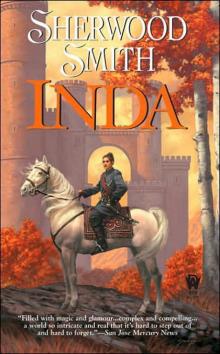 Inda
Inda Danse De La Folie
Danse De La Folie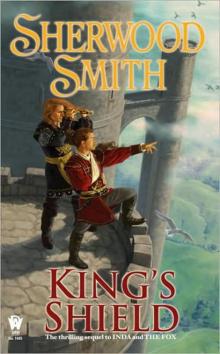 King's Shield
King's Shield Whispered Magics
Whispered Magics Fleeing Peace
Fleeing Peace Barefoot Pirate
Barefoot Pirate Crown Duel
Crown Duel Mearsies Heili Bounces Back
Mearsies Heili Bounces Back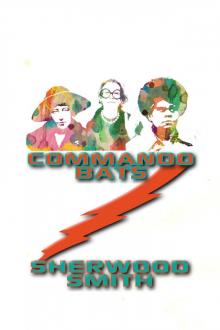 Commando Bats
Commando Bats A Stranger to Command
A Stranger to Command Lhind the Spy
Lhind the Spy The Spy Princess
The Spy Princess Blood Spirits
Blood Spirits Sasharia en Garde
Sasharia en Garde Lhind the Thief
Lhind the Thief Paradise Drift
Paradise Drift Banner of the Damned
Banner of the Damned The Trouble With Kings
The Trouble With Kings Poor World
Poor World Treason's Shore
Treason's Shore Wren Journeymage
Wren Journeymage A Posse of Princesses
A Posse of Princesses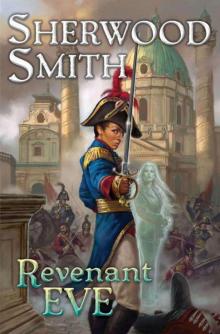 Revenant Eve
Revenant Eve Once a Princess
Once a Princess Time of Daughters I
Time of Daughters I Rondo Allegro
Rondo Allegro Coronets and Steel
Coronets and Steel Over the Sea
Over the Sea Senrid
Senrid Hunt Across Worlds
Hunt Across Worlds A Sword Named Truth
A Sword Named Truth The Fox
The Fox Twice a Prince
Twice a Prince Fair Winds and Homeward Sail: Sophy Croft's Story
Fair Winds and Homeward Sail: Sophy Croft's Story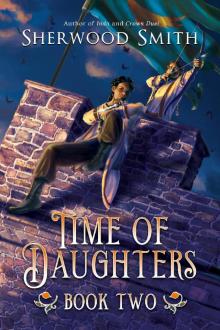 Time of Daughters II
Time of Daughters II The Rifter's Covenant
The Rifter's Covenant The Phoenix in Flight
The Phoenix in Flight Stranger
Stranger The Thrones of Kronos
The Thrones of Kronos A Prison Unsought
A Prison Unsought Twice a Prince: Sasharia En Garde Book 2
Twice a Prince: Sasharia En Garde Book 2